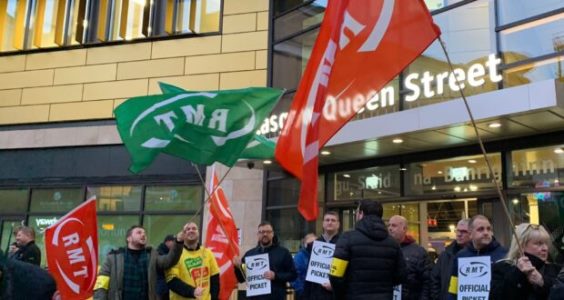
Socialist Party Scotland offers our full support to the RMT ScotRail members who shut down the rail network on 10 October for 24 hours. An overtime ban and an end to working rest days began on 14th October.
A members’ ballot in the summer rejected a significantly below-inflation pay offer of 5%. And as Mick Hogg, RMT Scottish Organiser said, the latest offer is a “kick in the teeth” which goes nowhere near the cost of living and constitutes a pay cut not acceptable to RMT members.
As Mick said: “RMT members are not prepared to sit back and watch the bosses get richer at the expense of the workers who deliver for ScotRail. If we don’t get more we will strike until we win….if it’s good enough for the bosses it’s good enough for the workers.”
The RMT action on ScotRail is taking place just two days following the latest strike on Network Rail. The action will hammer home to the SNP and Scottish Green government that workers are not prepared to continue to suffer while top ScotRail bosses cash in.
Incredibly for a nationalised company, ten ScotRail executives are on more than £100,000 a year. Managing director Alex Hynes’ salary is over £330,000, and yet he has the gall to claim that low-paid RMT members were “made a cracking offer – 5% on basic pay, a job guarantee for six years and a one-off technology payment of £500.” Quite rightly, this insult has been rejected. With inflation officially at 12%, a 5% offer is a disgrace.
The nationalised Scotrail, under the control of the SNP/Green government, carries the can for this. How a publicly owned company can justify such pay inequality underlines the need for socialist nationalisation.
Socialist Party Scotland calls for real socialist nationalisation of Scotrail and the whole railway system. That would mean removing the top management structure and placing the company under the democratic control and management of rail workers with elected committees involving passengers and local communities.
That way rail fares, staffing levels, investment and safety would be the priority. It would also mean an end to station closures and rail cuts generally. Massive public investment would expand, modernise and make the railways a sustainable environmental alternative.
With strikes on the railways, Royal Mail, BT, the dockers, universities, and ballots by teachers and civil servants, the working class is fighting back. The TUC and STUC should act to build the maximum level of coordinated strike action as a step towards a 24-hour general strike.
